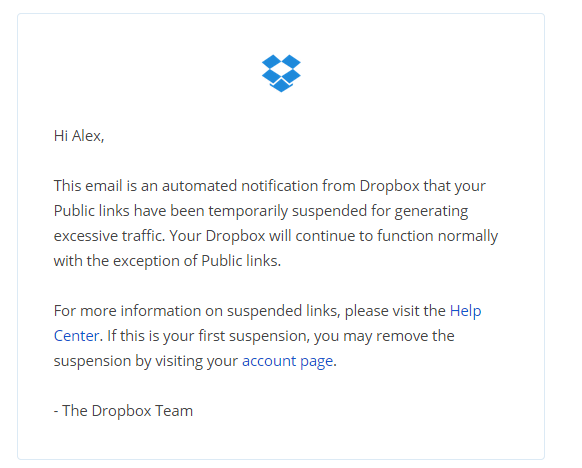Dealing with Dropbox Link Overages
Dropbox is a fantastic service. In addition to keeping my files synced across computers, I love the fact that I can give public links to others as an easy way to send large files.
Recently though, a few links of mine were getting pretty popular and I received the following very ambiguous message from Dropbox:

The frustrating thing was that they don’t say which link was generating excessive traffic, or how much traffic was being generated.
I ended up using Google Analytics events to track down the source of the excessive traffic, and saw that the majority of it was coming from one single file. If you are offering download links using Dropbox, it’s easy to track the number of downloads like this (you must include GA and jQuery):
// Track click events in GA and download file
$("#download-button").click(function(){
ga('send', 'event', 'Downloads','Some filename',{
'hitCallback': function() {
document.location.href = 'https://dl.dropboxusercontent.com/x/xxxxxx/myfile.zip';
}
});
});
A smart thing to do is create custom alerts in Google Analytics to let you know when clicks are approaching your bandwidth limit (20GB/day for free accounts, 200GB/day for Pro).
This got me thinking. How does the actual bandwidth limit work? Is it for individual files or the total bandwidth of all files in your public folder? Certain sites claim that it’s a limit only imposed on specific files while Dropbox’s Help Center says it’s the entire public folder as a whole.
I tested out a strategy of making five copies of my most popular file and having the download button randomly grab one of the five files each time it was clicked. Here is a simple example:
// Track click events in GA and download random version of file
$("#download-button").click(function(){
ga('send', 'event', 'Downloads','Some filename',{
'hitCallback': function() {
var n = Math.floor(Math.random() * 5) + 1,
f = "https://dl.dropboxusercontent.com/x/xxxxxx/myfile_"+n+".zip";
document.location.href = f;
}});
});
While I can’t prove this is what actually gets around the problem, I have not received any Dropbox notices since implementing this. My download numbers have stayed the same during this period, so this might be worth trying if you are having trouble with this issue.